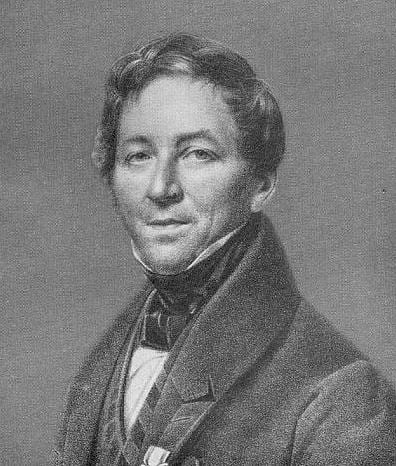by guest contributor Colin Guthrie King
August Boeckh (1785–1867) is in a certain sense the great unknown classicist of the nineteenth century. Boeckh was professor eloquentiae et poeseos (“of rhetoric and composition”) at the Friedrich-Wilhelms-Universität of Berlin (today’s Humboldt-Universität) from the university’s founding in 1810/1811 until 1864. Though we find him at the bottom of many a foundational development in modern classics—he was the founder of the Inscriptiones Graecae, and an early institutionalizer of the highly productive research and teaching model of the philologisches Seminar—the success and fame of later Berlin scholars such as Lachmann, Mommsen, Diels, Wilamowitz, and Jaeger would long eclipse him, along with much else which occupied the first half of the nineteenth century. In his Sachphilologie (“material philology”), Boeckh performed a detailed reconstruction of the history of culture and science in Greece that was well before its time, ranging from a study of the public economy of Athens to a reconstruction of real ancient weights and measures and the Greek chronological use of the cycles of the moon. It embraced a cultural-historical approach, opened new landscapes in the history of ancient science, and revealed formative influences on Greece from the Near East. But Boeckh’s restrained and often highly technical publications never managed to launch a program like the one he himself embodied in the breadth and depth of his learning.
Yet there was one important exception, a book he never published, but often read: Die Encyklopädie und Methodologie der philologischen Wissenschaften (The Encyclopedia and Methodology of the Philological Sciences). This was a series of lectures which Boeckh first gave when he became professor in Heidelberg in 1809, and which he delivered a total of 26 times throughout his career. Toward the end of Boeckh’s career, a young philosopher by the name of Ernst Bratuschek heard these lectures and was enthralled, and it is to Bratuschek that we owe an edition of them, published posthumously in 1877, and again in a second edition in 1886. The influence of these lectures on their over 1,500 listeners, among whom we can count several leading scholars of the nineteenth century, has only begun to be studied. But their importance as a document of methodological self-reflection in the field of classics is clearly great. In the “formal theory of philological disciplines” which begins the lectures, Boeckh articulates a theory of interpretation and organization of knowledge with wide scope and a powerful agenda. Philology, according to Boeckh’s famous definition, is the business of “understanding knowledge” (Erkenntnis des Erkannten), and philology’s objects in this business are not only, or not primarily, texts:
The entirety of the life and activity of mind and spirit constitutes the field of the known, and philology is thus committed to showing, for each nation, the whole of its mental development and the history of its culture in all directions. In all of these directions there is a logos which in its practical tint is already the object of philology; and in the cultivated nations the logos extends itself in all directions as conscious knowledge and reflection, so that these are subject to philological inquiry in a two-fold relation. The philology of antiquity has, then, as the material or object of its understanding the whole historical phenomena of antiquity (Boeckh, ed. Bratuschek 1877, 56, my translation).
This passage, representative of many others in the Encyklopädie, implies an account, reason, or regularity (thus logos) which are implicit in the actions of certain cultural practices, and explicit in the form of self-reflection: philology seeks to understand both. It is fitting, then, that Boeckh’s Encyklopädie should be reconsidered in light of recent attempts to study the practices and self-understanding of learned guardians and interpreters of texts across history, literatures, and cultures. The extension of philological understanding of non-Western canonical texts leads us to understand forms of knowledge which have been and remain beyond the horizon of classics, but from which classicists and historians of ideas can greatly profit.
The seminar “Methodological Questions for Globalized Classics,” now coming to a close as the first part of the Globalized Classics summer school organized by the August-Boeckh Centre for Classical Studies of the Humboldt-Universität zu Berlin, has recently undertaken such an effort. Lead by Anthony Grafton and Constanze Güthenke, and comprising early-career scholars of diverse classical disciplines and from North and South America, South Africa and Central Europe, the seminar focused on questions and problems entailed in opening classics to learned practices from outside the modern West. The participants both studied Boeckh and his Encyklopädie in their time and place, and discussed two recent major contributions to the emerging field of globalized classics: World Philology and Antiquarianism and Intellectual Life in Europe and China.
When drawing this connection, one quickly apprehends the delicacy of appreciating other “philologies.” For some time, and certainly since the nineteenth-century age of nationalism, philologists have sometimes been at the center of projects of vital cultural and political importance: the appropriation of Greece into a set of normative cultural topoi in Germany, for example, or the project of reconstructing an original Japanese literature. Classical philologists like Nietzsche who questioned the normative ends of their colleagues could run the risk of ostracization. Recent studies such as the chapters in World Philology, which build on Momigliano’s seminal 1950 paper “Ancient History and the Antiquarian,” have shown that the forces at work in the history of the collection and study of ancient artifacts and texts are shifting and manifold across cultures and times—and perhaps much more important for contemporary scholarly practices than it might seem.
When we open our understanding of philology to include a variety of legitimate learned practices outside the classics and the Western academy—a tendency evidenced by Sheldon Pollock in his introduction to World Philology—we have to ask if we deem these practices legitimate with regard to one coherent concept of philology, or by accepting a variety of equally legitimate context-specific philologies. The title “World Philology” would seem to tend towards the former option, and one might think that Boeckh would approve. But comparative studies in fact suggest a different tale: philologists across time and space employ very different approaches which hardly resemble each other: not least because problems of interpretation vary widely with the systems of writing and conventions of the texts they study, but also on account of fundamental differences in normative cultural contexts and the demands these make upon the interpreters.
Ultimately, then, the methodological questions for Globalized Classics may well become normative and practical, and particularly institutional: whose philology and which classics should be learned and studied? A cosmopolitan but shallow curriculum which includes a bit of everything is obviously flawed, and dallying in many disciplines while mastering none cannot be recommended as philological training. On another level, it would be foolish to think that an unquestioning acceptance of all other cultures and their attendant canons and norms could serve as a basis for “dialogue” and understanding. But engagement between philological and historical disciplines with a view to their respective histories and ends can help their practitioners better understand their own knowledge in a wider, and eventually perhaps truly global, context.
The institutional framework for such work is rare and fragile still. But there are, at least, theoretical foundations for this enterprise. As a project in understanding both knowledge of antiquity and our grasp on it, Boeckh’s Encyklopädie offers considerable resources in this regard—though they are sometimes difficult to mine in the absence of a genetic and critical edition of the text (and a decent English translation). But we also have the recollections of those who heard Boeckh speak. One such testimonial comes from Heymann Steinthal, the Berlin linguist and Sinologist who co-founded the Zeitschrift für Völkerpsychologie und Sprachwissenschaft (“Journal for the Psychology of Peoples and Linguistics”) in 1860. Boeckh remarks, in his lecture manuscript, “Steinthal understood me best” (Boeckh ed. Bratuschek 1877: 68), and he refers to two passages in Steinthal’s 1847 treatise De pronomine relativo (“On the Relative Pronoun”). In one of them, we find this:
And unless I am wrong, from our demonstration it will appear with the greatest clarity that the languages of the African peoples – against whom the most cultivated Christian nations have sinned so grievously, as do all those peoples who deem themselves the most free in the whole world right up to the present day, and whom some gladly despise on account of love of system and form – the languages of these, I say, will be shown most clearly to be excellent (Steinthal 1847: 54).
If this is how Boeckh thought his theory of philology should be understood, then it is clear that he still has much to say.
Colin Guthrie King is assistant professor of philosophy at Providence College. His research concerns ancient philosophy and science, particularly Aristotle, and the history of the modern historiography of ancient philosophy.





September 7, 2015 at 2:53 am
Please find two conversations with Colin Guthrie King and
Jas’ Elsner: http://trafo.hypotheses.org/2735 as well as
Anthony Grafton and Constanze Güthenke: http://trafo.hypotheses.org/2834 about Globalizing Classics on the blog TRAFO – Blog for Transregional Research.